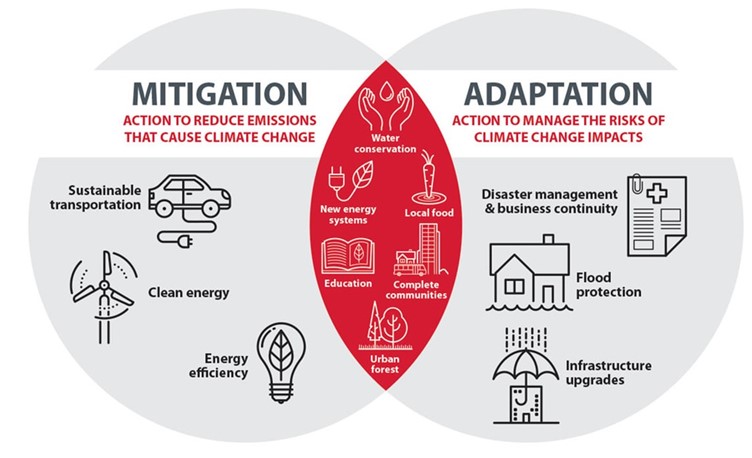On this page
About the Plan
The City of Guelph Climate Adaptation Plan is a comprehensive strategy designed to tackle the challenges posed by climate change, such as more extreme weather events.
It aims to build resilience and ensure Guelph’s long-term sustainability by identifying risks, establishing clear goals, and outlining specific actions to address climate impacts.
Climate Adaptation Plan – Executive SummaryClimate Adaptation Plan – Full report
Community engagement
The Climate Adaptation Plan is primarily an internal risk planning document, staff shared the plan with different audiences throughout the duration of the project:
- Public pop-up information events: We held two pop-up information events in April 2023 to share the draft Climate Adaptation Plan
- Outreach to community partners: We connected with different community partners (e.g., Grand River Conservation Authority, Wellington-Dufferin-Guelph Public Health, Alectra, Enbridge, University of Guelph) to learn from each other throughout the plan’s development.
- Outreach to community organizations: We connected with different community organizations to share details of the plan’s development.
- Engagement with Indigenous Nations: We engaged with Indigenous Nations to help shape the plan’s development.
Plan vision and goals
Vision: Guelph is adaptable and resilient in the face of a changing climate. We protect City assets and sustain what we have for an equitable, strong, vibrant, and safe community. We are future ready.
Strategic goals:
- Environment and health: Sustain environmental health, biodiversity, and individual wellbeing.
- Infrastructure: Prepare for the future with resilient built and natural infrastructure, while protecting existing resources.
- Economy: Strengthen economic prosperity by reducing the risk of economic loss; focus on adaptation actions that are fiscally responsible and achieve measurable long-term benefits.
- Safe: Reduce risk, strengthen our community’s emergency preparedness and disaster response.
- Equity: Ensure climate adaptation solutions cover all protected grounds under the Ontario Human Rights Code.
Adaptation actions
Our Climate Adaptation Plan outlines a range of proactive actions, both existing and new actions, to address climate impacts head-on. By implementing actions such as enhancing infrastructure resilience, and improving emergency preparedness, we aim to reduce vulnerability and increase our resilience to climate change.
Select existing and new actions include:
- Implement Guelph’s Official Plan Natural Heritage Policies, which seek to protect and restore natural heritage features and areas for the long term.
- Continue performance condition assessment and level of service reviews on all assets.
- Investigate and provide adequate transit shelter for users at popular transit stops, consider equity lens.
- Participate in regular emergency exercises with Wellington County, with whom paramedic services are shared and police services work closely together.
- Establish an Integrated Water Management Strategy for Guelph to minimize demand on drinking water supplies and increase water reuse opportunities.
- Continue to undertake tree planting initiatives.
- Continue conducting pilot project with the University of Guelph to optimize salt application during winter.
Monitoring and evaluation
The Climate Adaptation Plan’s progress will be monitored and evaluated regularly by City staff. A formal review and update will be done every five years. By continuously monitoring and evaluating our actions, we can ensure they remain adaptative and responsive to changing climate conditions.
About the City’s different climate change initiatives
Climate adaptation and mitigation are two sides of Guelph’s climate response strategy. While mitigation targets the reduction of greenhouse gas emissions to limit climate change, adaptation prepares us for the inevitable impacts of climate change. Our Climate Adaptation Plan focuses on the latter, aiming to fortify Guelph against possible adverse effects, such as more extreme weather events.
More information on Guelph’s mitigation initiatives can be found on the City’s Energy and Climate Change webpage and the annual Corporate Environmental Sustainability Report.

FIGURE 1 Mitigation versus Adaptation (from City of Calgary 2018)
For more information
Corporate Asset Management
Engineering and Transportation Services
City of Guelph
[email protected]
